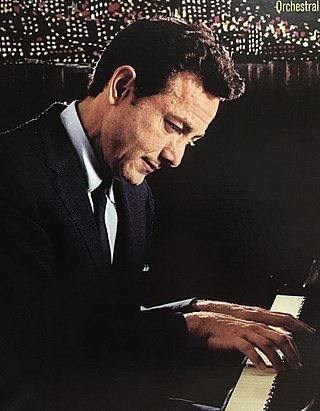Related Research Articles
The Alan Young Show is an American radio and television series presented in diverse formats over a nine-year period and starring English-born comedian Alan Young.
WJZ-TV is a television station in Baltimore, Maryland, United States, serving as the market's CBS outlet. It is owned and operated by the network's CBS News and Stations division, and maintains studios and offices on Television Hill in the Woodberry section of Baltimore, adjacent to the transmission tower it shares with several other Baltimore broadcast outlets.

Joseph "Joe" Bushkin was an American jazz pianist.
The Al Morgan Show is an American variety program broadcast on the DuMont Television Network from 1949 to 1951. The series starred pianist and songwriter Al Morgan. It was popular as a local show in Chicago before it went on the network.
The Armed Forces Hour is an American television program broadcast on NBC October 30, 1949 - June 11, 1950 and on the DuMont Television Network February 4, 1951 - May 6, 1951. Despite the title of the series, it was a half-hour program.
Paul Whiteman's Goodyear Revue is an American television variety series. The show aired on ABC on Sunday evenings from November 6, 1949, through March 30, 1952 hosted by Paul Whiteman.
Blind Date is an American television game show which aired on ABC, NBC, and then DuMont after many years on radio.
Who Said That? is a 1948–55 NBC game show that ran on radio and television, in which a panel of celebrities attempted to determine the speaker of a quotation from recent news reports.
Stop the Music is a prime time radio game show that aired on ABC Radio on Sundays, from March 21, 1948 to August 10, 1952. Stop the Music crossed over to ABC television on Thursdays, beginning on May 5, 1949 through April 24, 1952, and again for a half-hour from September 7, 1954, to June 14, 1956.
Club Seven is an American television variety series that was broadcast on ABC. The initial series, with 30-minute episodes, ran from August 12, 1948, through March 17, 1949. It was revived on September 11, 1950, and ran through September 28, 1951. Its episodes varied in length "since it was often truncated by five- or ten-minute newscasts or other series on either end." The show attempted to make viewers feel as if they were in a nightclub.
Dinner Date, also known as Dinner Date with Vincent Lopez, is a musical variety show that was broadcast on the DuMont Television Network on Saturdays from 8 to 8:30 pm ET from January 28, 1950, to July 22, 1950 or July 29, 1950.
Versatile Varieties, also known as Bonnie Maid Versatile Varieties and Bonny Maid Versatile Varieties, was a TV series that ran from 1949 to 1951 on NBC, CBS and ABC under three different formats. The sponsor was Bonnie Maid Linoleum.

The Bill Goodwin Show is a variety program that was broadcast on NBC television from September 11, 1951 to March 27, 1952.
That Wonderful Guy is an American situation comedy television program that was broadcast on ABC from December 28, 1949, through April 28, 1950. It featured Jack Lemmon in his first starring role on TV.
Saturday Night Review is a live American variety television series that was broadcast on NBC in 1953 and 1954 as a summer replacement for Your Show of Shows.

Easy Aces is an American comedy television program that was broadcast on the DuMont network from December 14, 1949, until June 14, 1950. It was also syndicated during its time on the network.
54th Street Revue is an American variety television program that was broadcast on CBS from May 5, 1949, through March 25, 1950. The program was a "showcase for up-and-coming professionals", originating from a theater on 54th Street in New York City.
Holiday Hotel is. an American television musical revue that was broadcast on ABC from March 23, 1950, until June 28, 1951 or October 4, 1951.
Inside U.S.A. With Chevrolet is an American television revue-style variety program that was broadcast on CBS September 29, 1949 - March 16, 1950. The program was not related to the book with that title or the Broadway revue of the same title.
Sing It Again is an American radio musical quiz program that was broadcast on CBS from May 29, 1948, through June 23, 1951. A television simulcast began on October 7, 1950.
References
- 1 2 3 Brooks, Tim; Marsh, Earle F. (June 24, 2009). The Complete Directory to Prime Time Network and Cable TV Shows, 1946-Present. Random House Publishing Group. p. 290. ISBN 978-0-307-48320-1 . Retrieved October 6, 2022.
- ↑ "Television". The Akron Beacon Journal. October 14, 1949. p. 40. Retrieved October 6, 2022– via Newspapers.com.
- 1 2 3 4 Bundy, June (September 3, 1949). "A Couple of Joes". The Billboard. p. 12. Retrieved October 7, 2022.
- 1 2 McNeil, Alex (1996). Total Television: the Comprehensive Guide to Programming from 1948 to the Present (4th ed.). New York, New York: Penguin Books USA, Inc. p. 183. ISBN 0-14-02-4916-8.
- ↑ "World Video Signs DeLugg, Hull for 'Joes'". The Billboard. December 24, 1949. p. 6. Retrieved October 7, 2022.
- 1 2 3 "Television Dog Star". Life. March 27, 1950. pp. 86, 89–90. Retrieved October 7, 2022.
- ↑ "Radio and Television: 'A Couple of Joes,' Vaudeville-Give-Away Show, to Bow Friday, Aug. 5, Over WJZ-TV" . The New York Times. July 20, 1949. p. 48. Retrieved October 6, 2022.
- ↑ "Henry White To Be Busy in Hollywood". The Billboard. January 14, 1950. p. 6. Retrieved October 7, 2022.
- ↑ "Add giveaway shows". Ross Reports on Television including The Television Index. January 22, 1950. p. 9. Retrieved October 8, 2022.
- ↑ Terrace, Vincent (2011). Encyclopedia of Television Shows, 1925 through 2010 (2nd ed.). Jefferson, N.C.: McFarland & Company, Inc., Publishers. p. 213. ISBN 978-0-7864-6477-7.